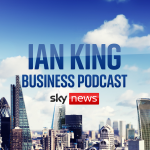In his annual Mansion House speech on Monday evening, Bank of England governor Andrew Bailey highlighted the overheated jobs market as a major driver of inflation.
Before some of those present had finished their first coffee the following morning came further evidence of why.
Labour market data from the Office for National Statistics showed average earnings (excluding bonuses) rose 7.3% in the three months to May, the highest on record and matching the figure for April, which itself was revised upwards from 7.2%.
The increase was above economists’ expectations.
They forecast the figure would dip as April’s figures included a rise in the national living wage that employers could not avoid.
Even without that one-off adjustment, the figures defied economic gravity, leaving the governor and the Chancellor of the Exchequer contemplating whether inflation will continue to do likewise.
Please use Chrome browser for a more accessible video player
There were some signs that demand for labour may be slowing despite the elevated earnings figures. The unemployment rate rose 0.2% to 4% and the number of vacancies in the economy fell to 1.034 million.
Wage growth was 7.3% from March to May in blow to Bank of England
Fixed mortgage rate at 2008 high after exceeding mini-budget peak
Revolution CEO would quit as part of Boohoo peace deal
While still high, and amid evidence that businesses are still creating jobs the market cannot fill, it’s now comfortably below the total number of unemployed which stands around 1.3 million. The number of economically inactive people also dipped again as more people returned to the workplace.
Is this a sign that the labour market may finally be cooling and the squeeze of higher interest rates is finally being felt in the real economy? Perhaps. If so, it isn’t happening fast enough yet to stop real earnings from falling.
Please use Chrome browser for a more accessible video player
CPI inflation is still at 8.7%, so even at elevated levels most wage rises are not keeping up.
Real incomes fell -1.7% according to the ONS. (Happily for the financial sector, though not perhaps for those who rely on it, it reported increases of 9%.)
As Mr Bailey told his City audience, it is not just wages driving inflation.
Persistent price rises are playing a part too, and the two appear to be chasing each other in an inflationary circle.
All of which has led markets to anticipate yet another interest increase from the Bank of England in August as the price of a two-year fixed-rate mortgage ticked up to a 15-year high, exceeding even the symbolic peak in the aftermath of Liz Truss’ mini-budget.






















